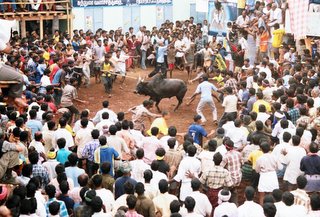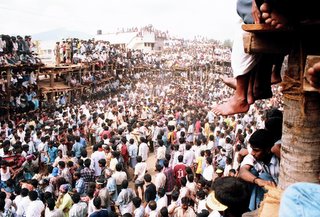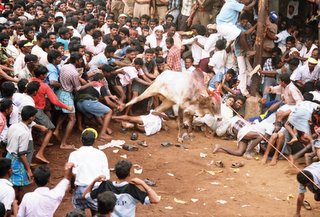Wednesday, January 25, 2006
By the horn
It's surprising how easily my eyes get used to flying dust. How soon I forget the unsteadiness of the wobbly wooden gallery (goda) that is supposed to keep me 'safe' 30 odd feet up in the air. How stupidly I actually think I can leave half way through this.
The first thing I'm told at Alanganallur is that once I'm there for the jallikattu, there's no leaving. I look in horror at a chap sharpening his bull's horn with obvious relish. Seeing my face, Hari (local reporter who can find his way out of vast fields and bridges suddenly breaking halfway on rivers) reassures me that all the exit restrictions are so a clueless stroller doesn't get in the way of a bull running wild in the village. "There are no rules in this game, you see. The bull can be anywhere, and it can think anyone is the bull-tamer."
So that's what it is about: A thousand mad bulls; more than 10000 people packed in the backyard of a small village temple; and no rules. One by one, the bulls are let loose into an arena full of unarmed bullfighters who go right for the horn.
The lady-with-the-stick who let us on the third floor of her goda says it used to be a one-man-to-one-bull game. Even now, the loudspeaker announcer keeps yelling that only one man can tame each animal, and the others are to please peel off the bull and let it go. The crackly voice keeps saying, in earsplitting volume, that the prize (could be anything: pressure cooker, non-stick pan, pot, pan, ladle, goat, hen, cot, almirah, dish antenna (really), TV, steel plates) is only for the guy who hangs on to the hump for 50 metres in the crowd as the bull bucks and twists to throw him off.
But no one's listening.
In all that boozed blind bravery, the bulls don't have it easy. Their tails are bitten, eyes poked, their stomachs prodded with sticks. But after watching for a while, I realize that the bulls are the ones that are managing tons better than the hundreds that lie in the hospital for weeks after this day.
I've heard of dark tourism, but can't put my finger on what it is about jallikattu that locks people into a spell... I caught myself watching wide-eyed, my hand in my mouth, my feet ice-cold. I found myself pointing frantically to whoever was nearby. Look, just look at that bleeding man. We talk of numbers immediately... how many injured last year, this year, today. How many already dying of blood loss. Then another bull comes charging into the crowd, and my hand goes to my mouth again. Our behaviour is only short of cheering.
A toothless old man with a thigh full of proud scars tells me it all started when small pox affected Alanganallur (Madurai district) ages ago. People prayed for a cure, and decided on this "blood sacrifice". So if even a year goes by without a drop of blood smearing the village earth, he says the local goddess will make sure an epidemic hits the village. "Of course, these days, there's no small pox," he adds, "So maybe cholera will come."
They can believe anything they want, and have any sort of game. But what happens on the back of the arena can't be called belief. Pouring arrack down the bull's throat, stuffing gaanja in their fodder, tying heavy stones to their balls... These bulls are trained all their lives for jallikattu, kept in isolation in a dark shed, seeing just the tender. Then once a year, it is let out into a ground full of mad men clawing at it. The animal loses it in a second. A wild game is one thing, but do they really have to mete out planned torture?
Hari tells me it's all in the business of bull trading. If a bull is tamed, it's sold cheap. If it escapes untamed, it goes for a super price. But the highest bidding is for bulls that steal the show (I'm told usually Trichy bulls)... ones that give the audience something to watch... some poking, butting, stamping, bleeding.
When I feel sick about a man getting gored, I am angry at the freakin bull because it isn't as defenseless as the men. The next moment, I see 20 guys poking the bull, pulling at its legs, and sticking needles up its hooves. I'm immediately on the animal's side. Till it waves its horns at a man in its way, and his white shirt is suddenly soaked red. On, and on, my mind played games.
For the audience, that's probably what jallikattu is. A 24-hour test of conscience.
Saturday, January 07, 2006
Hello, hello, mike testing...
It's fascinating the things a microphone can do, once held in front of a potential speaker.
Voices rage, chests thrust out, and fists pump the air. Worries usually coughed into a coal-stove spill forth in a rush as soon as the husband leaves the room. "No, he won't know when the programme airs on TV. Listen, I'll tell before he comes back for lunch."
Babies, of course, without exception, land their toothless mouths on the mike, and claw at it with their little fingers.
White khadi shirts comb their sparse hair all to one side in an attempt to hide the bald patch, straighten their collars and backs, and clear their throat. They know what they are going to say, and have said it many times before. People have yawned in their faces, and their run-of-the-mill lines have never been used in TV stories, but they're on auto-motor-mouth. But try to ignore the guy, and he'll fetch the whole community to scream in sync about how the media is biased. "You upper class convent educated media only want to show the flooded houses of the rich guys. You don’t even care if a poor man's corpse floats by you. Let's see you trying to come back to this area! I'll break your legs!"
That it is dramatic and baseless is beside the point. But how to get out the situation? Stick the mike in his face. Scream, if you will, into the mike, I say. He won't say much, but will be happy, and his party cadres will commend his intonation as he says, "Chief Minister must resign!" And we can continue to wade towards those marooned in their huts.
We're always asked if we're from Sun TV. Or Jaya TV. Some ask if we are Karunandhi. Or Jayalalitha. When we tell them it's an English news channel, the crowd disperses. Some inform the disinterested that "nowadays you can talk in Tamil for English channels also."
Some women, usually the first ones to speak, shuffle towards me. Many that talk to the mike know what the media likes. They've seen too many cameras, answered the same questions a trillion times, and seen nothing happen despite all that. They've also seen people's heart going out to the woman beating her chest in Nagapattinam. They saw the channel proudly showing off the impact of that footage. They know she received Rs. 6 lakh.
These women start from the beginning, tell me where the government machinery failed, where they themselves were at fault, what they need, and how sure they are not much help will come their way. The greater the pain, the more difficult it is to speak. Especially to someone holding a mike. Sometimes a tear or two wets the cheek. As if only someone's tears can tell us how unpredictably cruel life can be. I never know what to say, so just look on.
But, that day, when she cried that her daughter was washed away in the flood, the others behind her were smiling. They wanted her to talk to me, and cry, if she wanted, but they knew, just as well as I did, that she was lying. She had no daughter. I knew I wasn’t going to show this on TV, but none of us were angry about her lie. She'd been through agony, even if it wasn't because her baby died. Her only house broke, all her belongings were too soggy to be of any use ever and she was stuck with the loans she took to buy them, her husband couldn't go fishing, and she had no fish to sell. They had no water to drink, or food to eat for a month. Only cameras to talk to once in a while. Her daughter didn't have to die for her to cry. She thinks maybe more people are listening because she's crying.
Of course, everyone can see the drama in it all. Dripping with a stage-set sort of feeling. I will not carry her tears on TV just so people can ignore her other real agonies.
My only hope was the children. I remember being told they can never lie. When I ask a 7-year-old what happened to his sister who was born a few months ago, he looks me straight in the eye and says his father boiled her in the cauldron. But to the mike, he says she's growing up in grandma's house in the city.
I look for someone else who'll talk to the mike. Maybe they too will embellish the truth, or paint it in peaceful colours.
The eyes. We've just got to look at the eyes to know.
Voices rage, chests thrust out, and fists pump the air. Worries usually coughed into a coal-stove spill forth in a rush as soon as the husband leaves the room. "No, he won't know when the programme airs on TV. Listen, I'll tell before he comes back for lunch."
Babies, of course, without exception, land their toothless mouths on the mike, and claw at it with their little fingers.
White khadi shirts comb their sparse hair all to one side in an attempt to hide the bald patch, straighten their collars and backs, and clear their throat. They know what they are going to say, and have said it many times before. People have yawned in their faces, and their run-of-the-mill lines have never been used in TV stories, but they're on auto-motor-mouth. But try to ignore the guy, and he'll fetch the whole community to scream in sync about how the media is biased. "You upper class convent educated media only want to show the flooded houses of the rich guys. You don’t even care if a poor man's corpse floats by you. Let's see you trying to come back to this area! I'll break your legs!"
That it is dramatic and baseless is beside the point. But how to get out the situation? Stick the mike in his face. Scream, if you will, into the mike, I say. He won't say much, but will be happy, and his party cadres will commend his intonation as he says, "Chief Minister must resign!" And we can continue to wade towards those marooned in their huts.
We're always asked if we're from Sun TV. Or Jaya TV. Some ask if we are Karunandhi. Or Jayalalitha. When we tell them it's an English news channel, the crowd disperses. Some inform the disinterested that "nowadays you can talk in Tamil for English channels also."
Some women, usually the first ones to speak, shuffle towards me. Many that talk to the mike know what the media likes. They've seen too many cameras, answered the same questions a trillion times, and seen nothing happen despite all that. They've also seen people's heart going out to the woman beating her chest in Nagapattinam. They saw the channel proudly showing off the impact of that footage. They know she received Rs. 6 lakh.
These women start from the beginning, tell me where the government machinery failed, where they themselves were at fault, what they need, and how sure they are not much help will come their way. The greater the pain, the more difficult it is to speak. Especially to someone holding a mike. Sometimes a tear or two wets the cheek. As if only someone's tears can tell us how unpredictably cruel life can be. I never know what to say, so just look on.
But, that day, when she cried that her daughter was washed away in the flood, the others behind her were smiling. They wanted her to talk to me, and cry, if she wanted, but they knew, just as well as I did, that she was lying. She had no daughter. I knew I wasn’t going to show this on TV, but none of us were angry about her lie. She'd been through agony, even if it wasn't because her baby died. Her only house broke, all her belongings were too soggy to be of any use ever and she was stuck with the loans she took to buy them, her husband couldn't go fishing, and she had no fish to sell. They had no water to drink, or food to eat for a month. Only cameras to talk to once in a while. Her daughter didn't have to die for her to cry. She thinks maybe more people are listening because she's crying.
Of course, everyone can see the drama in it all. Dripping with a stage-set sort of feeling. I will not carry her tears on TV just so people can ignore her other real agonies.
My only hope was the children. I remember being told they can never lie. When I ask a 7-year-old what happened to his sister who was born a few months ago, he looks me straight in the eye and says his father boiled her in the cauldron. But to the mike, he says she's growing up in grandma's house in the city.
I look for someone else who'll talk to the mike. Maybe they too will embellish the truth, or paint it in peaceful colours.
The eyes. We've just got to look at the eyes to know.
Subscribe to:
Posts (Atom)


